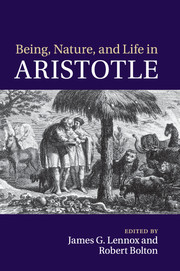Book contents
- Frontmatter
- Contents
- Preface
- Notes on contributors
- Acknowledgments
- Allan Gotthelf: a biographical sketch
- Note on abbreviations
- Introduction
- 1 Teleology, Aristotelian and Platonic
- 2 Biology and metaphysics in Aristotle
- 3 The unity and purpose of On the Parts of Animals 1
- 4 An Aristotelian puzzle about definition: Metaphysics Ζ.12
- 5 Unity of definition in Metaphysics Η.6 and Ζ.12
- 6 Definition in Aristotle's Posterior Analytics
- 7 Male and female in Aristotle's Generation of Animals
- 8 Metaphysics Θ.7 and 8: Some issues concerning actuality and potentiality
- 9 Where is the activity?
- 10 Political community and the highest good
- Allan Gotthelf's contributions to classical philosophy
- References
- Index locorum
- General index
3 - The unity and purpose of On the Parts of Animals 1
Published online by Cambridge University Press: 06 December 2010
- Frontmatter
- Contents
- Preface
- Notes on contributors
- Acknowledgments
- Allan Gotthelf: a biographical sketch
- Note on abbreviations
- Introduction
- 1 Teleology, Aristotelian and Platonic
- 2 Biology and metaphysics in Aristotle
- 3 The unity and purpose of On the Parts of Animals 1
- 4 An Aristotelian puzzle about definition: Metaphysics Ζ.12
- 5 Unity of definition in Metaphysics Η.6 and Ζ.12
- 6 Definition in Aristotle's Posterior Analytics
- 7 Male and female in Aristotle's Generation of Animals
- 8 Metaphysics Θ.7 and 8: Some issues concerning actuality and potentiality
- 9 Where is the activity?
- 10 Political community and the highest good
- Allan Gotthelf's contributions to classical philosophy
- References
- Index locorum
- General index
Summary
INTRODUCTION: THE UNIT OF UNITY
In the first chapter of Generation of Animals 5 Aristotle turns to a discussion of the affections in virtue of which parts differ from one another, noting that while some of these are found universally throughout kinds of animals, some (e.g. color of eyes, hair, feathers) are distributed somewhat randomly, and develop at different times in different individuals. “We should not suppose,” he cautions, “that the mode of explanation in these and all such cases will be the same” (778a29–31). In particular, if a feature is neither common to animals nor a distinguishing feature of some kind or other, we should not suppose it either is or came to be for the sake of anything. Rather, in these cases we should suppose the affections in questions came to be of necessity and should explain them by reference to matter and the source of their having changed. He then seeks for a deeper justification.
For as was stated according to principles in the primary accounts (kat'archas en tois prōtois logois), it is not because each thing's coming to be is of a certain sort that it is of a certain sort; rather it came to be such a thing on account of its being of this sort; for generation follows on and is for the sake of being; being is not for the sake of generation. (778b2–7)
- Type
- Chapter
- Information
- Being, Nature, and Life in AristotleEssays in Honor of Allan Gotthelf, pp. 56 - 77Publisher: Cambridge University PressPrint publication year: 2010
- 3
- Cited by

